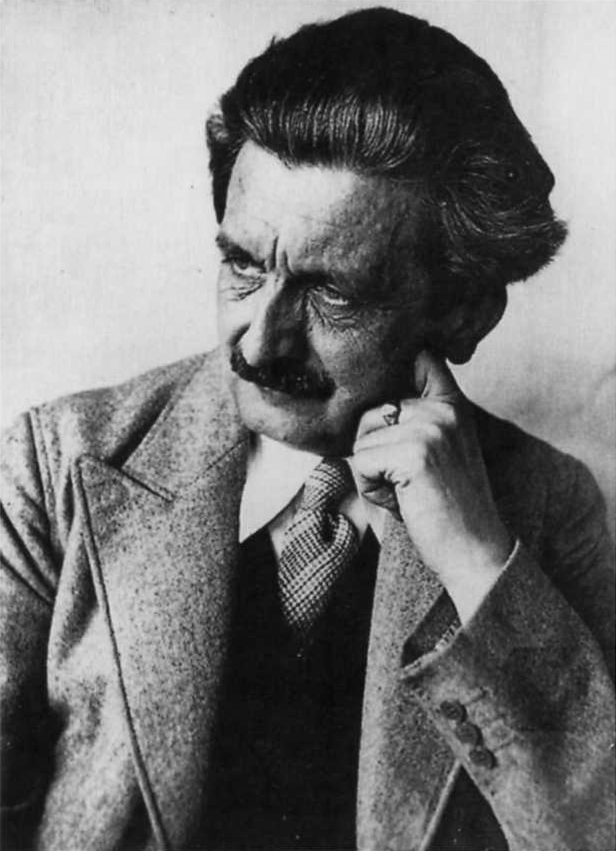

Queer Places:
Am Zirkus 12a, 10117 Berlin, Germany
 Adolf
Brand (14 November 1874 – 2 February 1945) was a German writer, egoist
anarchist, and pioneering campaigner for the acceptance of male bisexuality
and homosexuality.
Adolf
Brand (14 November 1874 – 2 February 1945) was a German writer, egoist
anarchist, and pioneering campaigner for the acceptance of male bisexuality
and homosexuality.
He became a school teacher briefly before establishing a publishing firm and producing a German homosexual periodical, Der Eigene (The Unique) in 1896. This was the first ongoing homosexual publication in the world,[1] and ran until 1931. The name was taken from writings of egoist philosopher Max Stirner, who had greatly influenced the young Brand, and refers to Stirner's concept of "self-ownership" of the individual. Der Eigene concentrated on cultural and scholarly material, and may have had an average of around 1500 subscribers per issue during its lifetime, although the exact numbers are uncertain. Contributors included Erich Mühsam, Kurt Hiller, John Henry Mackay (under the pseudonym Sagitta) and artists Wilhelm von Gloeden, Fidus and Sascha Schneider. Brand contributed many poems and articles himself. Brand's writings, together with those of other contributors to Der Eigene, aimed at a revival of Greek pederasty as a cultural model for modern homosexuality.[2]
In 1899/1900 Brand published Elisar von Kupffer's (1872–1942) influential anthology of homoerotic literature, Lieblingminne und Freundesliebe in der Weltliteratur. The work was reprinted in 1995. In 1899, he was sentenced to a year in prison for publicly striking Ernst Lieber, a Reichstag delegate and head of the Catholic Church-linked Center Party, with a dog whip.
Brand became involved in Magnus Hirschfeld's Scientific-Humanitarian Committee (the first public homosexual rights organization), until there was a split in 1903; that same year Brand led the formation of the Gemeinschaft der Eigenen organisation with the scientist Benedict Friedlaender as principal theorist, and Wilhelm Jansen. In the 1920s this would develop into the Freikörperkultur under Adolf Koch. The GdE was similar to other such groups in Germany at the time, such as the Wandervogel. Wilhelm Jansen, co-founder of the Gemeinschaft der Eigenen, was one of the chief financial supporters of the Wandervogel and also a leader in it.[4] The writings and theories of the romantic anarchist John Henry Mackay (1864–1933) had a significant influence on the GdE from 1906.[5] Mackay had lived in Berlin for a decade and had become a friend of Friedlaender, who did not share the anarchist leanings of Brand and Mackay, favoring instead the thinking on 'natural rights' and land reform, then current in Germany.
Long before the advent of the term, Brand was a proponent of "outing" politicians who publicly proclaimed anti-gay positions while privately practicing homosexuality. In 1904, he claimed in print that Friedrich Dasbach, a Center Party Reichstag delegate, consorted with male prostitutes. Dasbach threatened to sue Brand for libel, but they reached an out-of-court settlement. In 1907, Brand claimed in print that German chancellor Prince von Bülow (1849–1929) had a long-standing homosexual relationship with Privy Councilor Max Scheefer. This time Brand was brought to court on libel charges and was sentenced to eighteen months in prison. In a later justification for outing, Brand stated: "When someone ... would like to set in the most damaging way the intimate love contact of others ... at that moment his own love life ceases to be a private matter."
Brand was also sentenced to two months in prison in 1905 for publishing allegedly "lewd writings" in Der Eigene. During World War I Brand and the GdE curtailed their activities for the duration; Brand served in the German army for two years and married a nurse, Elise Behrendt. After the war the enforcement of Paragraph 175 slowly declined.
The GdE and other groups formed a united 'action committee' with Magnus Hirschfeld's group, to formulate a new law. In 1925 more groups joined and the larger Cartel for Reform of the Law against Sexual Offenses was formed. Despite a new law being drafted, it was not voted on, and by 1929 there was no further chance to reform Paragraph 175.
Adolf Brand gave up homosexual activism in the early 1930s, after constant harassment from the Nazis who silenced Der Eigene, destroyed his life's work and left him in financial ruin. After the sacking and burning of the Institut für Sexualwissenschaft, he finally sent a public letter to his followers announcing the end of the movement.
He and his wife were killed by an Allied bomb on 2 February 1945. He was 70 years old.
My published books: